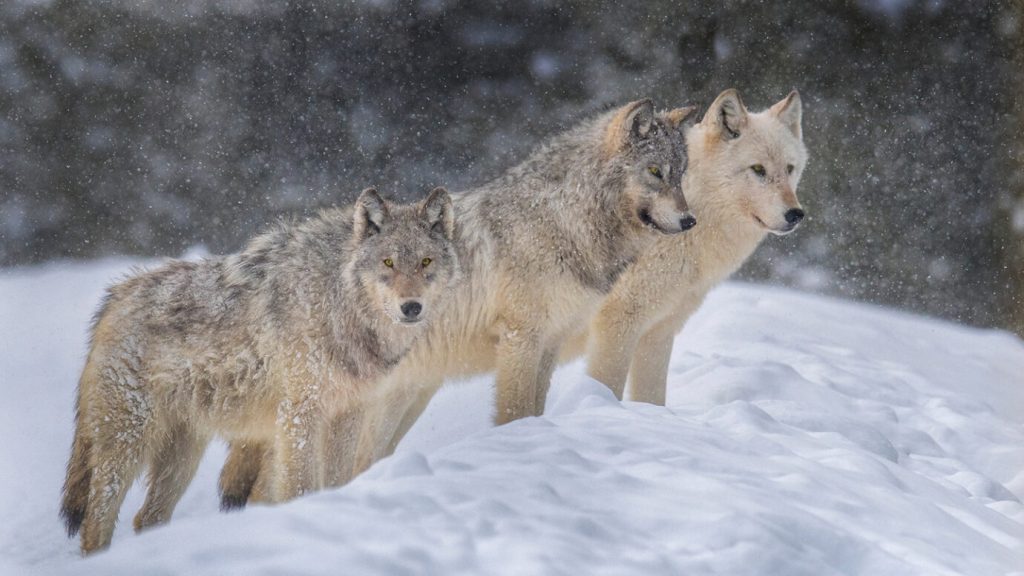A parasite makes wolves more likely to become pack leaders

A parasite might be driving some wolves to lead or go solo.
Wolves in Yellowstone National Park infected with Toxoplasma gondii make more daring decisions than their uninfected counterparts, researchers report November 24 in Communications Biology. The wolves’ enhanced risk-taking means they are more likely to leave their pack, or become leaders of their own.
“Those are two decisions that can really benefit wolves, or could cause wolves to die,” says Connor Meyer, a field biologist at the University of Montana in Missoula. The findings reveal a parasite’s potent ability to influence a wolf’s social fate.
Disease is often considered important for wildlife, mostly in the context of killing its host, Meyer says. “We have evidence now that just being infected with a certain parasite — Toxoplasma — can have pretty major implications for wolf behavior.”
Single-celled T. gondii has a track record of altering animal behavior. Its most important hosts are cats, which provide a breeding ground for the parasite in their small intestine. The parasite offspring hitch a ride on feline feces. Other animals then ingest the parasite, which then manipulates its new hosts’ behavior by tweaking certain hormones, making the hosts bolder or more aggressive. Infected mice, for example, can fatally lose their fear of cats, allowing the parasite to infect more hosts once the mice are consumed (SN: 1/14/20).
In Yellowstone National Park, many wolves are also infected with T. gondii, recent research has shown. So Meyer and colleagues wondered if gray wolves (Canis lupus) in the park showed any parasite mind-bending of their own.
Wolves were reintroduced to Yellowstone in 1995. Ongoing study of the park’s packs meant that the researchers had access to about 26 years’ worth of blood samples, behavioral observations and movement data for 229 of the park’s wolves.
The team screened the wolf blood for antibodies against T. gondii parasites, which reveal an infection. The researchers also noted which wolves left their pack — usually a family unit consisting of a breeding pair and their offspring — or became a pack leader.
Both are high-stakes moves for a wolf, Meyer says.
Infected wolves were 11 times as likely as noninfected wolves to disperse from their pack, the team found, and about 46 times as likely to eventually become leaders. The findings fit in with T. gondii’s apparent ability to boost boldness across a wide range of warm-blooded life.
The study fills a crucial gap in the Toxoplasma pool of knowledge, says Ajai Vyas, a neurobiologist at Nanyang Technological University in Singapore, who was not involved with the study.
“Most of the earlier work has been done in the lab,” Vyas says. But there are limitations to that approach, especially for re-creating how animals experience the effects of the parasite in their natural environment. Such research has “become almost like studying whale swimming behavior in backyard pools; [it] does not work very well.”
Wolves’ enhanced boldness may even form a feedback loop, the team proposes. The researchers found that not only do cougars (Puma concolor) in the park carry the parasite, but wolves’ infection rates were highest when the animals’ ranges overlapped with the park’s densest aggregations of cougars. Infected wolf leaders may be more likely to bring pack members into riskier situations, including approaching cougar territories, making additional infections more likely.
The feedback-loop idea is “very fascinating,” but more research is needed to confirm it, says Greg Milne, an epidemiologist at the Royal Veterinary College in London, who was not involved with the study. Such research may involve determining if infected wolves are more likely to migrate into an area with more cougars.
“I think people are just starting to really appreciate that personality differences in animals are a major consideration in behavior,” says study coauthor Kira Cassidy, a wildlife biologist at the Yellowstone Wolf Project in Bozeman, Mont. “Now we add a parasite-impacting behavior to the list.”
Next, the team is interested in examining the long-term consequences of a T. gondii infection, and whether infected wolves make better leaders or dispersers than uninfected wolves.
It’s also not known how infection impacts survival and reproduction rates, Cassidy says. “Infection may very well be detrimental in some ways and advantageous in others.”